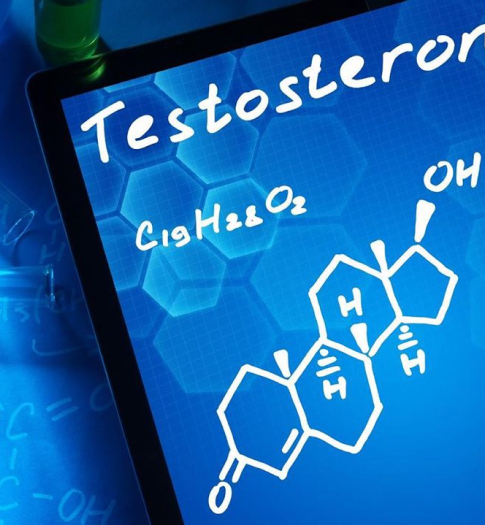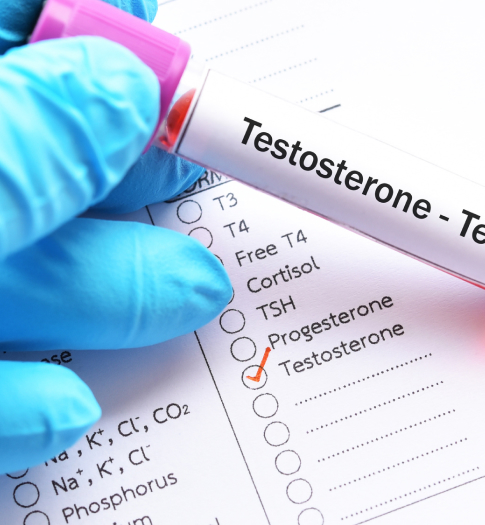Titan T-Center & Weight Loss is dedicated to delivering the residents of League City and Friendswood, Texas outstanding low testosterone therapy. Our priority is to provide you, our valued patient, with quality hormone treatments to improve your quality of life. Although low testosterone is more prevalent as men age, we see patients of all ages.
Testosterone Replacement Therapy (TRT)
What is Low Testosterone?
Low testosterone, or hypogonadism, is a condition in which the body’s natural production of the hormone is below normal levels. By the age of 30, it is very common for men to begin seeing a decline in testosterone.

Symptoms of
Low T
Men may see a variety of symptoms, including but not limited to a decrease in sex drive, lack of energy, hair loss, and more. Although age plays a factor in the production of testosterone, diabetes and excessive weight have also been associated with the condition. See our article on Low T symptoms to learn more.

Testosterone Treatment
The goal of Low T treatment is to supplement the body with testosterone to achieve optimal levels. Although there are a variety of testosterone treatments, Titan T-Center exclusively provides testosterone injections to our patients.

Why Testosterone Injections?
Testosterone injections enable the hormone to enter the bloodstream directly, avoiding vital organs such as the liver (excessive testosterone can be damaging to the liver). We carefully monitor hemoglobin and prostate levels, among other indicators, to prevent any harmful side effects from occurring.

- Is Low T or TRT Therapy right for you?
- Take our low t quiz to find out
Frequently Asked Questions
Prior to undergoing testosterone replacement therapy, we imagine you may have a few questions that need answering. We have dedicated this section to answering some of our most commonly asked questions in order to educate you on the condition and treatment involved. If you are unable to find an answer to a specific question, please feel free to contact us by phone or email so that we can address your query as best we can.
Testosterone is a sex hormone that is produced by the testes. Although testosterone levels are more prevalent in males, females also naturally produce the hormone through the ovaries. The production of the hormone is regulated by both the hypothalamus and pituitary glands. The hormone is a vital component for sexual development, muscle growth, bone density, fat distribution, mood, and energy.
Like most hormones, testosterone is secreted into the bloodstream, where it is able to affect numerous areas of the body by acting on androgen receptors on cells. In linking up with a cell’s androgen receptor, the hormone is able to affect the cell, no matter if it is a neuron, bone, muscle or fat cell. Within a couple days, the cell will change in order to provide the necessary effect. Testosterone levels are subject to change throughout the day and vary from individual to individual.
Individuals who are experiencing decreased energy, increased central body fat, decreased libido, erectile dysfunction, depression, anxiety, poor concentration, and decreased strength may be suffering from low testosterone. Although these symptoms are frequently associated with Low Testosterone, it is possible that they are caused from another medical matter. Therefore it is imperative to have your testosterone levels checked prior to undergoing any sort of treatment for low testosterone.
Testosterone levels can be measured by a blood test. Normal total testosterone levels are generally considered to range from 300 ng/dL to 1000 ng/dL.
Although there are a variety of causes for Low Testosterone, they are generally divided into two categories: primary deficiency and secondary causes. Primary deficiency is associated with a problem with the testes, whereas secondary causes stem from a problem outside the testicles that is prohibiting normal hormone production.
Primary disorders include the following:
- Chromosomal abnormality
- Undescended testis
- Prior mumps infection
- Cancer treatment
- Other causes of injury to the testicle itself
Secondary causes include:
- Hypothalamic or pituitary disorder
- Medications
- Concurrent illness
- Inflammatory disease
Many studies have shown that testosterone levels decline with age in most men. How exactly this decline happens is still unclear. If a patient is diagnosed with hypogonadism, or low testosterone, it is important to rule out other medical causes such as illness. According to the FDA, the benefits and safety of testosterone replacement therapy (TRT) used in attempts to relieve symptoms in men who have low testosterone for no apparent reason other than aging have not been established.
When T levels drop below normal, the brain typically triggers a signal to the testes to increase production. However, derangements in the body’s physiology due to the above causes can alter this normal pathway. Recent studies have shown a link between Low Testosterone and cardiovascular disease, increased mortality, anemia, diabetes, and depression. Additionally, these studies have shown individuals that have gone through testosterone replacement therapy have either improved or reversed many of these risks.
In many clinical studies, testosterone therapy has proven to reduce body fat, improve diabetes, protect against atherosclerosis, and improve bone density. Additionally, restoring testosterone to a normal level has shown to decrease the risk of coronary artery disease. Subjects exposed to therapy may also see improvements in cognitive function, anxiety, mood, and protect against Alzheimer’s disease.
However, it is important to note that each patient is different and that results from testosterone replacement therapy are not guaranteed.
Unfortunately, due to the biology of the testosterone molecule, pills and tablets may cause liver damage. Currently, there is no FDA-approved, safe testosterone tablet or pill. This has resulted in the development of creative ways to get testosterone safely into the body, such as patches, gels, subcutaneous implants, and injections.
Patches and gels allow for the absorption of testosterone molecules through the skin. However, there is variable absorption in each patient, and it may be difficult to achieve target levels. Additionally, these methods can be “messy” and require contact precautions around children and other individuals. Subcutaneous implants require a minor surgery to insert the pellet under the skin, and it becomes difficult to adjust dosages. Injections require a higher frequency of treatment, but the dosages can be finely adjusted to achieve target levels.
Many individuals strongly associate testosterone with people seeking to enhance muscle growth or improve athletic ability. Unfortunately, this hormone has gained a poor reputation for this reason. If diagnosed, administered, and monitored correctly, individuals with Low Testosterone may see a substantial change in their overall health. A significant majority of scientific data demonstrates that testosterone replacement therapy is safe when administered correctly by a health professional.
Testosterone has shown to increase red blood cell count, which thickens the blood and may lead to clots. Other risks associated with testosterone include pulmonary embolisms, heart attacks, and strokes. Titan T-Center & Weight Loss pays close attention to red blood cell numbers and takes appropriate measures to ensure that the count stays in the normal range. For more information concerning heart risk, we invite you to read our blog on the testosterone levels and cardiovascular risk.
Furthermore, we advise all patients to take a look at the latest FDA ruling, in which the FDA has concluded that there is a possible increased cardiovascular risk associated with testosterone use.
This idea was originally developed circa 1941 and has since been debunked through many scientific studies. A scientific review has shown that there is no conclusive evidence of increased risk of prostate cancer with testosterone therapy, and early data shows that testosterone therapy is not contraindicated in men with a history of prostatic intraepithelial neoplasia. However, it is important to consult with your provider at Titan T-Center & Weight Loss, and to have an in-depth conversation about the relationship of prostate cancer and testosterone replacement therapy in your individual circumstances.
Titan T-Center & Weight Loss exclusively provides testosterone injections to our patients because they are significantly safer and more effective than other forms of treatment. For patients who experience severe levels of fatigue on a regular basis due to B12 deficiency, we happily provide B12 injections. Finally, HCG or human chorionic gonadotropin may be administered after the first month’s treatment to stimulate the testes and prohibit testicular atrophy. For more information, please call or contact us!
Your levels of testosterone will go back to pre-treatment levels, or possibly below pre-treatment levels. Just like most medications, the body “uses” the testosterone, thereby requiring regular dosages. However, the effects of testosterone therapy, such as increased bone density and lean body mass, may linger for weeks or months.
Testosterone replacement therapy and laboratory testing is covered by many insurance carriers, although you should check the terms of your current plan to be sure. Titan T-Center does not accept Medicare or Medicaid at this time. We offer flexible cash payment plans for patients paying out-of-pocket.
See what some of our patients have to say.
Our goal as a low T clinic is provide professional, friendly, and efficient care to all our patients. But don’t just take our word for it! See what these patients had to say.
We don’t cut corners.
"As a fitness professional, I highly recommend this place. When it comes to your health, you cannot cut corners. I assure Titan does nothing of the sort either. The products this establishment works with are top notch. Furthermore, they really take care of you and your health. This is definitely the place to go."
- C. N.
Unprecedented Professionalism
"An amazing place, if I could give them 6 stars I would. The staff is unprecedented in their professionalism as well as their care and humility. [The Titan staff members] are incredible."
- C. K.
- Interested in losing weight and keeping it off?
- Check Out Our Weight Loss Services